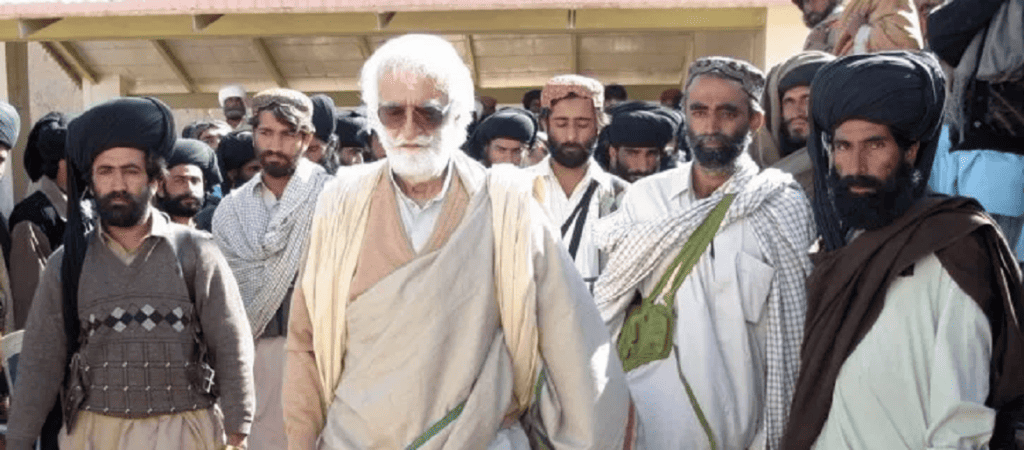By Abdul Ghafoor Khan
Nawab Akbar Khan Bugti, chief of the Bugti tribe. A 79-year-old elderly man with a whitish beard and mustache, a renowned and respected personality who dedicated his entire life to working for the prosperity and code of conduct of the Baloch people. He was killed on August 26, 2006, and his assassination changed the political and security dimensions of Balochistan.
Bugti’s death intensified the already existing separatist movements, which had experienced earlier phases in 1948, 1958, 1968 and 1973. But the fifth phase proved to be the deepest and most entrenched.
Following the attack on Akbar Bugti, protests and escalating tensions erupted in different parts of Balochistan, especially in Dera Bugti, Pusni, Kholu and the capital Quetta.
Nawab Akbar Khan Bugti, a graduate of Oxford University, had a strong personality and was strongly opposed to the idea of an independent Balochistan. He remained incredibly loyal to the state and had voted for the creation of Pakistan. When there was a debate on whether or not Balochistan should join Pakistan, Bugti argued in favor of membership. Despite his stature, in his dealings with ordinary people he showed humility. He would stand up and greet them warmly.
In December 2005, just months before the military operation against Bugti was executed, Musharraf said: “There are two or three tribal chiefs and feudal lords behind what’s going on in Balochistan. The past governments have made deals with them and indulged them. My government is determined to establish its writ. It will be a fight to the finish”. Unfortunately, Security measures implemented during that time exacerbated the issue, implementing the old technique of suppression utilized by the Pervez Musharraf regime to counter-insurgency. The sudden “disappearance” of vocal activists (who later turn up dead) does not discourage activism; it only serves to enrage.
In 2004, he was called upon to establish a single Baloch national party to unite all Baloch tribes on one page. However, due to Islamabad’s intervention, the venture failed
Musharraf declared a military operation in Balochistan in 2005, specifically targeting the Bugti and Marri regions. The very concept of “national integrity” and the notion “one nation” came under threat. The state itself was responsible for the killing of its own people. Dera Bugti and Kholu, areas predominantly populated by the Bugti and Murri tribes under siege. The situation was very bad. Bombings commenced in 2006, and during a Jirga (a people’s gathering), Bugti’s house was struck by a missile.
The central government’s exploitative practices and violation of Baloch rights have been at the center of the issue from the beginning. Balochistan, a province rich in natural resources, is ignored and dissatisfied in Pakistan.
The Balochistan issue goes beyond mere dissatisfaction; it strikes at the heart of Pakistan’s national integrity. Pakistan is a diverse state, comprising multiple ethnicities, languages, sects, and cultures, and facing numerous challenges such as economic hardship, education, unemployment, poverty, and external threats such as India. These factors contribute to the complexity of the situation.
In a January 2005 interview, Bugti questioned the possibility of negotiations and political movements under these circumstances, saying, “How can negotiations and a military operation coexist? If the government attacks us, who do they expect us to negotiate with?”
The killing of a single individual is not the appropriate response to such an uprising; in fact, such actions can further deteriorate Pakistan’s national integration. Senator Mushahid Hussain, who was part of the negotiation team sent to meet Akbar Bugti, once mentioned in an interview with Al Jazeera, “We found Nawab Bugti to be very reasonable, willing to negotiate, and open to discussion and settlement. However, there exists a mindset within the Pakistani establishment that is unwilling to acknowledge the legitimate rights of smaller provinces like Balochistan. I vividly recall my conversation with General Musharraf, where we were on the verge of reaching a settlement, but certain impediments arose. He questioned how we could trust Bugti and believe in his intentions. I replied that this is not about intentions but about achieving results. Unfortunately, the state of Pakistan and the establishment always perceive the Baloch people as enemies and show no willingness to address the Balochistan issue. Additionally, there are cases of missing persons, illegal abductions, and the killing of Baloch students from educational institutions.”
In conclusion, the gap between the government and the people of Balochistan now exceeds that of the years 2007-2010. The binding force of national integration has weakened significantly. To bridge this gap, the state must adopt people-centered policies that contribute to Pakistan’s development and prosperity, with a specific focus on Balochistan. Malik Siraj Akbar, a journalist and managing director of the Balochistan Institute, a Baloch think tank based in Washington, D.C., suggests that treating Balochistan as a safe haven for various Taliban and extremists, as has been done in recent years, will only lead Baloch nationalists to struggle against the religious extremism and paranoia that prevails among the Baloch population. The fact that the state treats them as enemies has only made the situation worse. A change in the state’s foreign policy can bring more stability to the province.
Pasni’s population continues to protest the killing of Bugti fourteen years ago and the drastic changes they now face as the epicenter of the China-Pakistan Economic Corridor (CPEC). In light of these circumstances, Dashti’s warning and advice comes to mind, “Ignoring the Baloch’s grievances will only exacerbate tensions. CPEC represents a golden opportunity for the state to prosper while addressing the Balochs’ concerns.”
Author: Abdul Ghafoor Khan – Independent researcher, graduated from the University of Balochistan, Pakistan. He holds a prominent position as an Executive member of the Human Rights Council of Pakistan, Balochistan wing. Abdul Ghafoor Khan specializes in critical areas such as nuclearization in the Middle East, European Affairs, and the multifaceted realm of international war, peace, and security.
(The views expressed in this article belong only to the author and do not necessarily reflect the views of World Geostrategic Insights).







